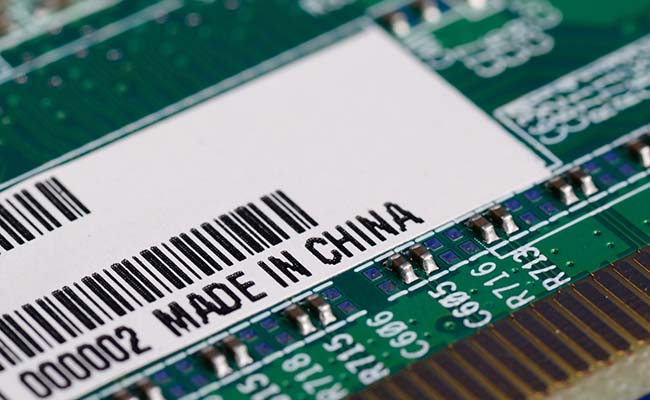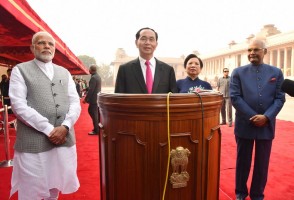
Free trade agreement with China will not benefit India
The Dollar Business Bureau  Time is not yet ripe for India to go ahead and sign a Free Trade Agreement (FTA) with China, says the Associated Chambers of Commerce of India (ASSOCHAM). This was stated by the ASSOCHAM in its paper on ‘Should India sign a Free Trade Agreement with China?’, released on Monday. In its study, the ASSOCHAM further suggested that such FTA may not fit at this point of time, even though such an arrangement is a key issue of economic cooperation in order to face Chinese competitiveness in the international markets. The Sino-India economic cooperation is huge and important, but, at this juncture, it would bring gains in favour of China and will further reinforce the existing trade gaps between the two countries, the study noted. The report went on to say that China’s significance in the manufacturing sector is favoured by its policies, labour laws, productivity and a supportive import tariff regime enabling efficient manufacturing. Whereas, India-China FTA cannot afford accelerated elimination of tariffs and India will have to face some challenges in reducing and eliminating tariffs over a short time horizon. Commenting on the same, the ASSOCHAM spokesperson says, “In view of the comparative advantage China enjoys in manufacturing, any form of trade agreement between the two has to tread cautiously.” India’s opening up of the trade sector has to be carefully calibrated to balance the interests of domestic manufacturing over the medium term, he added. Further on the ways to smoothen the trade imbalance between the two countries, the report suggests Indian trade sector be complemented with greater openings for its commercial services market in order to balance its trade with China. Under the FTA or the Preferential Trade Agreement (PFA), the trade balance depends on the trade structure and initial import tariff rate. In this case, the Indian commodities being exported to China, facing tariffs, will have gains, however, the industries having more imports from China, protected by tariffs may have to face real challenges, says the study. So, the difference between India’s high-tariff regime and China’s low-tariff regime will definitely pose serious on import tariff issues. It has to be gradual with reduction in tariffs in a phased manner covering commonly agreed, selected, manufacturing services and agricultural products. The key negotiations between the two countries should take into account the issues related to interests, sensitivities and other specific differences to ensure a friendly FTA enabling free flow of goods, services, investment, labour and capital, it added. A FTA or PFA between the two countries will favour China and is disadvantageous to India even in the short-run, the study noted. In this regard, the benefit of FTA will not be able to create a mutual-sharing environment between India and China, given the different tariff rates and structural features of both the economies, it added.
Time is not yet ripe for India to go ahead and sign a Free Trade Agreement (FTA) with China, says the Associated Chambers of Commerce of India (ASSOCHAM). This was stated by the ASSOCHAM in its paper on ‘Should India sign a Free Trade Agreement with China?’, released on Monday. In its study, the ASSOCHAM further suggested that such FTA may not fit at this point of time, even though such an arrangement is a key issue of economic cooperation in order to face Chinese competitiveness in the international markets. The Sino-India economic cooperation is huge and important, but, at this juncture, it would bring gains in favour of China and will further reinforce the existing trade gaps between the two countries, the study noted. The report went on to say that China’s significance in the manufacturing sector is favoured by its policies, labour laws, productivity and a supportive import tariff regime enabling efficient manufacturing. Whereas, India-China FTA cannot afford accelerated elimination of tariffs and India will have to face some challenges in reducing and eliminating tariffs over a short time horizon. Commenting on the same, the ASSOCHAM spokesperson says, “In view of the comparative advantage China enjoys in manufacturing, any form of trade agreement between the two has to tread cautiously.” India’s opening up of the trade sector has to be carefully calibrated to balance the interests of domestic manufacturing over the medium term, he added. Further on the ways to smoothen the trade imbalance between the two countries, the report suggests Indian trade sector be complemented with greater openings for its commercial services market in order to balance its trade with China. Under the FTA or the Preferential Trade Agreement (PFA), the trade balance depends on the trade structure and initial import tariff rate. In this case, the Indian commodities being exported to China, facing tariffs, will have gains, however, the industries having more imports from China, protected by tariffs may have to face real challenges, says the study. So, the difference between India’s high-tariff regime and China’s low-tariff regime will definitely pose serious on import tariff issues. It has to be gradual with reduction in tariffs in a phased manner covering commonly agreed, selected, manufacturing services and agricultural products. The key negotiations between the two countries should take into account the issues related to interests, sensitivities and other specific differences to ensure a friendly FTA enabling free flow of goods, services, investment, labour and capital, it added. A FTA or PFA between the two countries will favour China and is disadvantageous to India even in the short-run, the study noted. In this regard, the benefit of FTA will not be able to create a mutual-sharing environment between India and China, given the different tariff rates and structural features of both the economies, it added.
May 5, 2015 | 1:20 pm IST.





 to success.
to success.